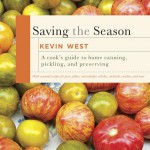- So-Cal by way of the South: On Monday, July 29, Kevin West will talk about his Appalachian upbringing and his L.A-style preserving opus, Saving the Season Josh Norris
- Alfred A. Knopf, Kevin West
Kevin West was not the world’s most likely jam fanatic.
His first job out of college was at Vogue. He spent 13 years at W magazine. He lives in L.A., wears blazers with jeans and looks generally coifed and hip as any L.A. fashion writer probably should.
But a few years back, he made his Tennessee grandmother’s strawberry jam and sparked an “obsession,” as he calls it. In 2009, he started a blog called “Saving the Season” that chronicles his experiences making all kinds of preserves: jams, pickles, fermented vegetables and more. In June, he released a cookbook of the same name based on the blog.
He doesn’t garden, and he’s not an urban homesteader, he says. Rather, he buys his produce at farmers markets and makes his preserves for the simple pleasure of it.
The result is Saving the Season, a cookbook, a storybook and a hardy reference, with appendices that chronicle the peak seasons of dozens of varieties of produce by region.
West will speak about his adventures in canning at Malaprop’s on Monday, July 29.
For more information, check out West’s blog at savingtheseason.com, or look for him in the Winter issue of Lucky Peach.
Mountain Xpress: We're right on the other side of the mountains from where you spent time as a kid in Tennessee, and we're not too far from Spartanburg. Is that mostly where you grew up?
Kevin West: When I was growing up, we lived in Spartanburg and Greenville, and then we moved up to Bethesda, Md., after my freshman year in high school. We moved around a fair amount, but my grandparents' place in Blount County [between Asheville and Knoxville] was always the fixed point during my childhood. That's the place that my mom and I always talked about as home. … I grew up in other places, but always, again, with that sort of feeling in my bones that Tennessee is where I'm really from.
I'm always interested in the ways people see the South, and choose to relay it to other people. That's one of the things I notice: that the South tends to be what you want it to be. It's this imaginary thing you carry with you. I see that some in your book.
There are many, many ways we could talk about that, and this is something I say a lot to folks from other parts of the country. [They] don't necessarily understand what a crazy quilt of micro-regions the South is. The South is not monolithic.
The South is a varied place, and I think especially having moved away from the South and lived elsewhere, it gives you a very imaginative relationship with the place where you're from. It gives you a perspective to really think a lot about what it means to be Southern when you don't live in the South anymore.
That's stuff that was very much in my mind when I was working on this book.
Do you feel at all like you have feet in two camps, or is that a reductive way of seeing the South versus Southern California?
I've certainly got feet in both places, and I'm constantly torn about where I would like to buy a piece of land and start planting fruit trees. On some days, I'm just as sure as I can be that I want to be in the South, either east Tennessee or Western North Carolina.
I've written about Asheville [for Departures magazine in 2012], so I've been through Asheville several times in the last couple of years, and I really love it there. One day, I'm convinced that I want to be in that part of the world, and then the next day, I think, “Gosh, I will always go home to the South, but I really want to set down roots here in coastal/southern/central California so that I can grow citrus, so that I can grow apricots.” At this point in my life, I don't know where I'll wind up planting fruit trees.
So growing fruit yourself is on your agenda? In the book you talk about how gardening is not a priority of yours at this point.
Yeah, it's not a priority at this point. But you know, [my grandfather] was a farmer, and my dad has a farm, and Uncle David has a pretty farm. I want to have that experience and that pleasure of having a place and planting trees on it and watching those trees grow.
Since we're sort of on the subject of Asheville, I was very happy to see that in your Southern Living interview, the little bit they ran on you [in June], that you chose Asheville as your dream trip for eating. We're always thrilled to see ourselves in print. Could you talk a little about that?
In January of 2012, my mom and stepfather and I, post-holidays, we took a little weekend getaway up at Grove Park Inn. I hadn't been to Asheville in many years, and we just found so much good food there. The night we wandered into Cúrate and had dinner there, I flipped my wig. I couldn't believe that we were eating such wonderful and really cosmopolitan food in the Southern Appalachians.
Boy, what can I say? I think that Asheville has got to be one of the best food towns in the country right now. The thing that's so striking to me is the food scene there is supported by this fantastic, rich and varied network of small farms and small producers in the countryside around there. … It's an ideal eating community.
Someone told me — I think it was the folks at French Broad Chocolates — that the third time you visit Asheville, you buy a house. I'm overdue to buy a house.
I'm interested in the differences between food culture here and [in L.A.], especially since there is an abundance of farms there. Do people not have the same sorts of relationships with small farms?
Los Angeles is a city of however many millions of people, so there are many different sorts of food scenes out here, and different sorts of relationships to agriculture. It's really hard to generalize.
On the one hand, you've got the industrialized agriculture of the central valley, which is the fruit bowl — or the bread basket — of a huge amount of the country. On the other hand, you've got small growers like Windrose Farm and Flora Bella Farm, folks that I write about in the book, that are selling at the farmers market in Santa Monica, one of the best farmers markets in the country.
Those growers there, the conscientiousness of their work, really defines another kind of ideal for agriculture, for sustainable agriculture today.
Do you feel like this model of canning [in your book] is economical?
It can be if you've got a backyard full of tomatoes.
But for you, someone who doesn't grow food?
I think there are a lot of reasons to preserve, and some of those reasons have to do with economy. Some of those reasons have to do with opting out of the industrial food system. Some of those reasons have to do with the satisfaction, the pleasure, of working with food that is grown locally and processed in your own kitchen.
When I'm making cocktail onions with teensy pearl onions that I buy at the farmers market, if you wanted to sit down and do a real dollars-and-cents calculation, that probably winds up being a real expensive jar of cocktail onions, but you know, I make maybe two jars of cocktail onions a year, and I really like having them.
It's not necessarily a bargain to make those onions, but is there a value to it? And yes, I think the value is substantial and meaningful.
Have people asked you that question often?
To tell you the truth, no. At least, here in Los Angeles and in the urban centers where preserving has become a trendy thing to do, I think the interest in preserving is driven less by necessity — like, people need to preserve the food that's in their garden, or people need to put up a lot of jars of something so that they don't go hungry this winter. It's not so much a matter of necessity as it is of curiosity.
What about the culinary side of things? Are there any important distinctions you want to draw people's attention to?
One of the ideas behind Saving the Season is that the best preserves you're going to make, whether they're sweet or they're savory, are made with the fruit and the vegetables that you get nearby, that you get from your backyard or your local farmstand or farmers market.
The book is trying to be an evocation, and it's about being observant about the seasons where you live. It's about being curious about the produce that's available where you live. The book is about trying to share an enthusiasm, and to share what was for me a real journey of discovery.
But all I wanted to do was make jam. And yet somehow, along the way, by getting interested in preserving, I found myself learning so much about the world that was really unexpected and that was so exciting. I wanted to share that journey of discovery with Saving the Season.








Before you comment
The comments section is here to provide a platform for civil dialogue on the issues we face together as a local community. Xpress is committed to offering this platform for all voices, but when the tone of the discussion gets nasty or strays off topic, we believe many people choose not to participate. Xpress editors are determined to moderate comments to ensure a constructive interchange is maintained. All comments judged not to be in keeping with the spirit of civil discourse will be removed and repeat violators will be banned. See here for our terms of service. Thank you for being part of this effort to promote respectful discussion.